Confusing sentences that make sense are a fun way to play with the English language. They’re like fun word games. And show us how dynamic the English language can be. English is a particularly funny language. There are many rules in the language that makes no sense, and more exceptions to those rules that make even less sense. Some sentences are tricky to pronounce, and others sound absurd but are grammatically correct. Some sentences are short, and some are too long.
Here are confusing English sentences that will leave us scratching our heads.
Confusing sentences in English
Let’s start the list with a classic confusing sentence:
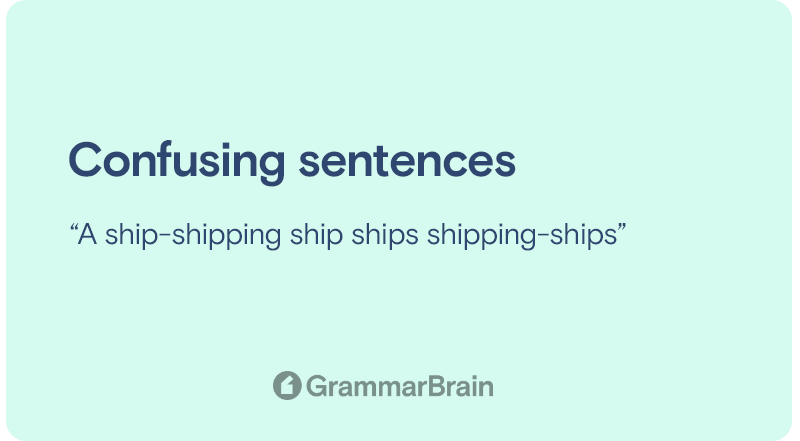
1. “A ship-shipping ship ships shipping-ships”
Does this sentence sound confusing, and possibly wrong? To our surprise, this sentence makes perfect grammatical sense. It’s possible to come up with such a confusing sentence because the word ship is a noun, adjective, and verb.
Let’s break down the sentence:
A ship-shipping ship = A ship made for the purpose of shipping other ships (yes, it is confusing)
ships = the verb ship, to transport something
shipping-ships = another term for container ships
We can see the sentence makes perfect sense and is grammatically correct. But this is just the beginning. There are many similar sentences in English and other sentences that are weird in different ways.
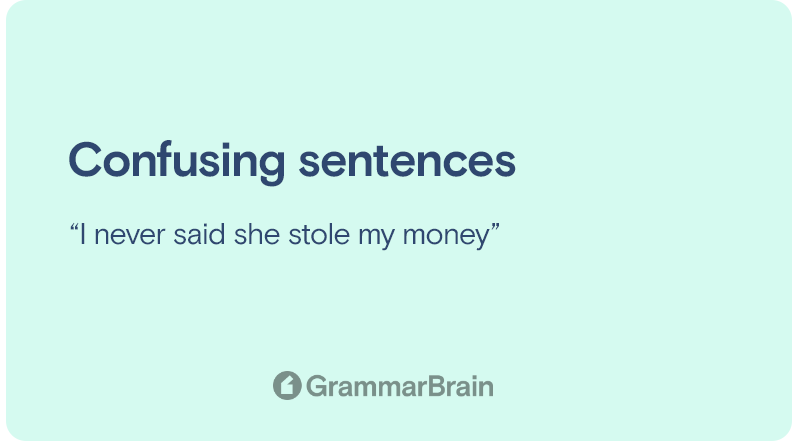
2. “I never said she stole my money”
This sentence is funny and interesting because it has seven different meanings depending on which word the focus is on. Here’s how it goes:
I never said she stole my money (but someone else said so)
I never said she stole my money (I am not saying or implying that she stole my money)
I never said she stole my money (I suggested/implied it)
I never said she stole my money (She didn’t steal my money, someone else did)
I never said she stole my money (She did not steal it, she took/robbed it)
I never said she stole my money (She stole someone else’s money)
I never said she stole my money (She didn’t steal money, she stole something else)
Fascinating, isn’t it? It’s amazing how which word or syllable is stressed determines the meaning of a sentence.
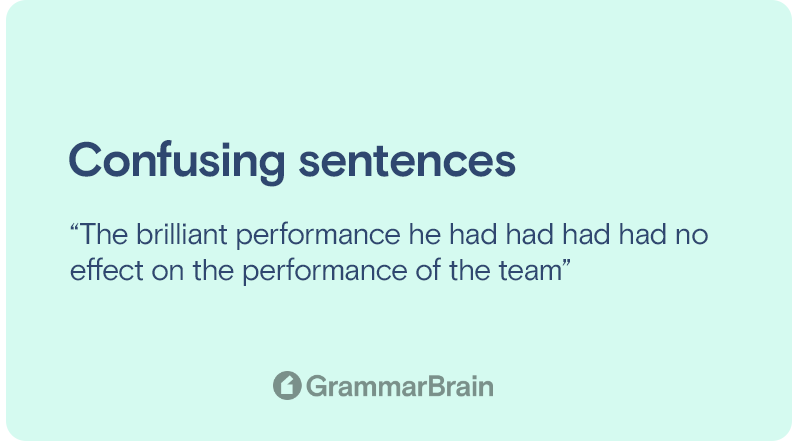
3. “The brilliant performance he had had had had no effect on the performance of the team”
Most English teachers would say this sentence is outright incorrect. The funny thing is, it isn’t. In this sentence, the first had had is a modifier, and the second had had is the main verb. That makes this sentence grammatically correct, but definitely very confusing.
Center embedding
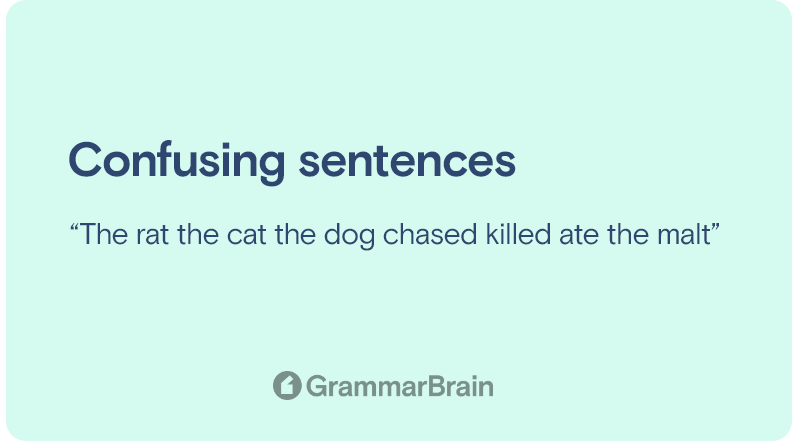
4. “The rat the cat the dog chased killed ate the malt”
The above sentence uses what linguists call center embedding. In simple words, it means using a phrase within another phrase. In English, it’s possible to increase the number of phrases within a phrase without making the sentence grammatically incorrect (that’s the rule!).
Let’s break down the sentence:
The rat ate the malt
The rat the cat killed ate the malt (refers to the rat in relation to what the cat did to it)
The rat the cat the dog chased killed (the dog chased the cat, the cat killed the rat) ate the malt
A simpler framing of this sentence would be: “The dog chased the cat, and the cat killed the rat that ate the malt”.
Tongue Twisters
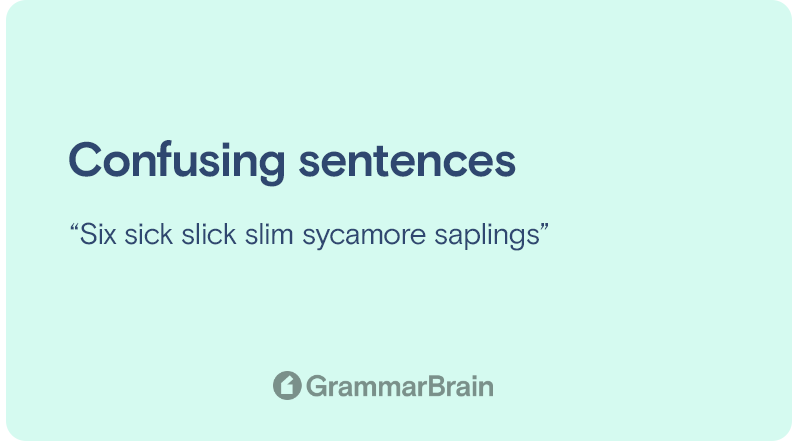
5. “Six sick slick slim sycamore saplings”
This sentence is what we know as tongue twisters or difficult-to-pronounce sentences. Practicing tongue twisters can improve pronunciation and oration skills. There are plenty of tongue twisters in English. Here are some examples:
- Peter Piper picked a peck of pickled peppers
- Black background, brown background
- She sells seashells by the seashore
- Which witch switched the Swiss wristwatches?
Wordplay
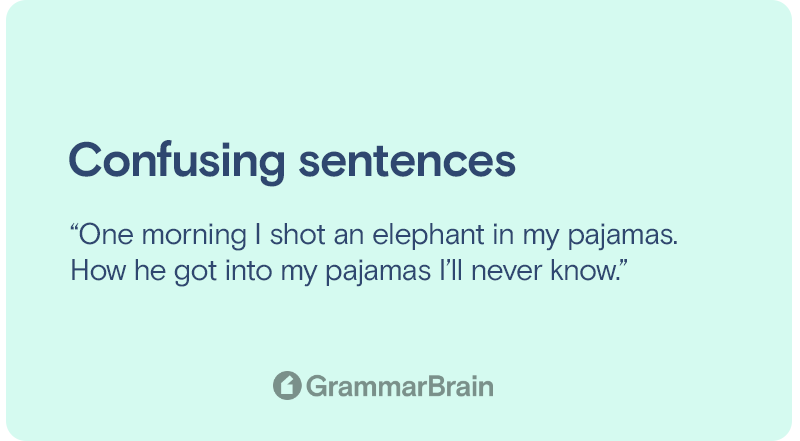
6. “One morning I shot an elephant in my pajamas. How he got into my pajamas I’ll never know.”
The above sentences are part of a joke by comedian Groucho Marx. The second sentence leads the listener/reader to misinterpret the first sentence. There are two possible meanings of the first sentence One morning I shot an elephant in my pajamas:
I shot an elephant in the morning while wearing pajamas
I shot an elephant who was wearing my pajamas
This sentence is an example of clever and humorous wordplay.
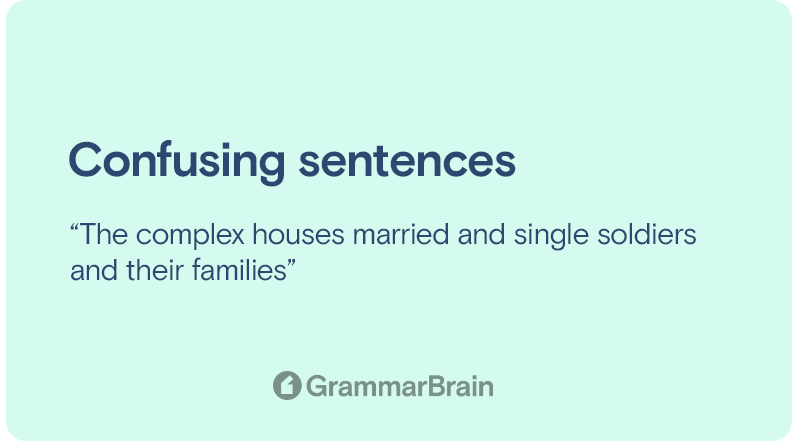
7. “The complex houses married and single soldiers and their families”
This sentence is relatively easier to unravel with a fair understanding of sentence structures. Here, the complex houses (accommodates) married and single soldiers (both married and unmarried soldiers) and their families. Doesn’t sound that confusing once it’s broken down.
Garden-path sentences
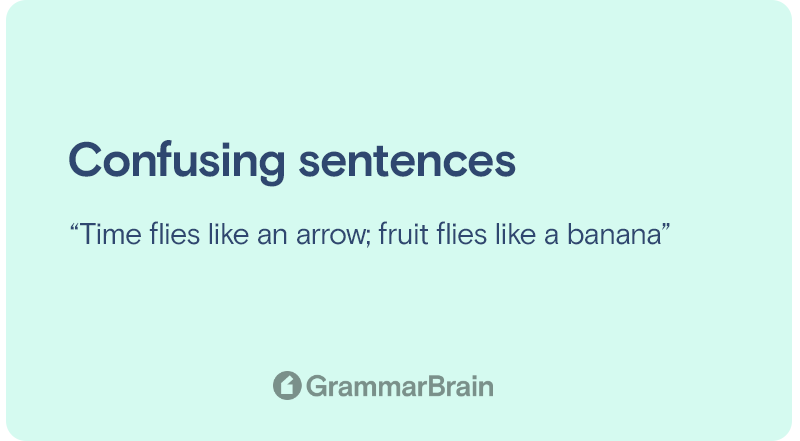
8. “Time flies like an arrow; fruit flies like a banana”
Garden-path sentences are sentences that deliberately being in a confusing way, leading the reader to misinterpret their meaning. The above sentence is a garden-path sentence. The first and second part of the sentence talks about different things. Time flies like an arrow, that is, time goes fast. Fruit flies like a banana, that is, fruit flies (insects) like bananas.
We hope this lesson on confusing sentences piques your interest in the English language’s nuances.
FAQs
1. Which sentences are considered confusing in English?
A confusing sentence has any of the following features:
- Seemingly incorrect grammar
- Hard to understand
- Different possible meanings
- Hard to pronounce
2. What are garden-path sentences?
Despite being grammatically correct, a garden-path sentence begins in a way that an error in interpretation is very likely to happen.
3. What are tongue twisters?
Tongue twisters are sequences of words (phrases or sentences) that are difficult to correctly pronounce, especially in one go. Tongue twisters are typically alliterative.
4. What are more examples of strange sentences that are confusing?
Exceeding trifling witling, considering ranting criticizing concerning adopting fitting wording being exhibiting transcending learning, was displaying, notwithstanding ridiculing, surpassing boasting swelling reasoning, respecting correcting erring writing, touching detecting deceiving arguing during debating.
Inside this article
Fact checked:
Content is rigorously reviewed by a team of qualified and experienced fact checkers. Fact checkers review articles for factual accuracy, relevance, and timeliness. Learn more.
Core lessons
Glossary
- Abstract Noun
- Accusative Case
- Anecdote
- Antonym
- Active Sentence
- Adverb
- Adjective
- Allegory
- Alliteration
- Adjective Clause
- Adjective Phrase
- Ampersand
- Anastrophe
- Adverbial Clause
- Appositive Phrase
- Clause
- Compound Adjective
- Complex Sentence
- Compound Words
- Compound Predicate
- Common Noun
- Comparative Adjective
- Comparative and Superlative
- Compound Noun
- Compound Subject
- Compound Sentence
- Copular Verb
- Collective Noun
- Colloquialism
- Conciseness
- Consonance
- Conditional
- Concrete Noun
- Conjunction
- Conjugation
- Conditional Sentence
- Comma Splice
- Correlative Conjunction
- Coordinating Conjunction
- Coordinate Adjective
- Cumulative Adjective
- Dative Case
- Determiner
- Declarative Sentence
- Declarative Statement
- Direct Object Pronoun
- Direct Object
- Diction
- Diphthong
- Dangling Modifier
- Demonstrative Pronoun
- Demonstrative Adjective
- Direct Characterization
- Definite Article
- Doublespeak
- False Dilemma Fallacy
- Future Perfect Progressive
- Future Simple
- Future Perfect Continuous
- Future Perfect
- First Conditional
- Irregular Adjective
- Irregular Verb
- Imperative Sentence
- Indefinite Article
- Intransitive Verb
- Introductory Phrase
- Indefinite Pronoun
- Indirect Characterization
- Interrogative Sentence
- Intensive Pronoun
- Inanimate Object
- Indefinite Tense
- Infinitive Phrase
- Interjection
- Intensifier
- Infinitive
- Indicative Mood
- Participle
- Parallelism
- Prepositional Phrase
- Past Simple Tense
- Past Continuous Tense
- Past Perfect Tense
- Past Progressive Tense
- Present Simple Tense
- Present Perfect Tense
- Personal Pronoun
- Personification
- Persuasive Writing
- Parallel Structure
- Phrasal Verb
- Predicate Adjective
- Predicate Nominative
- Phonetic Language
- Plural Noun
- Punctuation
- Punctuation Marks
- Preposition
- Preposition of Place
- Parts of Speech
- Possessive Adjective
- Possessive Determiner
- Possessive Case
- Possessive Noun
- Proper Adjective
- Proper Noun
- Present Participle
- Prefix
- Predicate



